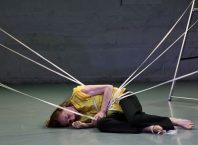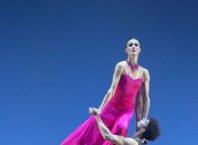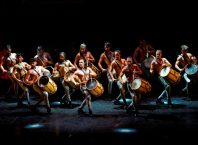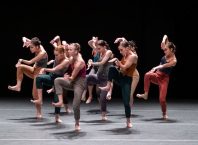Escrito está en mi alma vuestro gesto
Garcilaso de la Vega 1503 – 1536
Fragments of Spanish float past my ears, dancers move across the stage in fading light. Bare arms curve above a black dress; the dancers disappear into the wings. The sound of water hovers over a black stage: Nacho Duato’s Compañia Nacional de Danza begins their dress rehearsal at the Suzanne Dellal Centre in Tel Aviv.
Conjuring a sensual world of the spirit, Gnawa, first performed by the company in 2007, refers to the practices and music of mystic brotherhoods in Morocco who seek ecstasy through song, dance and ritual. An undulating line of dancers moves to the serpentine rhythms of Spanish and North African sounds. A man and a woman glow in an incandescent duet: moth and flame dance in twilight.
The dancers rehearse onstage between the different works, as Duato observes from the stands, attentive to every detail. Shadows of movement on the unlit stage, each dancer moves within a particular moment in time; each moment different.
Castrati, created in 2002, recreates the world of Italian opera when the Catholic church forbade women to perform onstage, bringing about the custom of castrating male singers before they reach puberty to retain a childlike soprano. The all male cast exudes a powerful masculinity. Members of a secret society clad in black robes and wristbands induct a lone dancer, painfully vulnerable in pale shorts and a transparent, clinging blouse into the tortured magnificence of their order. His anguished limbs quiver in the contortions of a tortured soul. Dancers attired in pale tights and flowered corsets embody the contradiction of an aching lack, disfiguration that creates a startling beauty sung from the dark spaces of the heart.
The last work of the evening is Por Vos Muero from 1996, celebrates Spanish culture of the 15th and 16th centuries. Referring to a time when dance played a central role in the elaborate social structure with a score that interweaves Spanish music of that era with the poetry of Garcilaso de la Vega. Transcending time and genre Duato’s choreography touches history and poetry with the force of all that cannot be uttered. An upraised palm, a backward glance, the oblique seduction of courtly love and the unassailable power of the church move the dance from playful flirtation to somber sorrow and back again. What lies behind the mask? The gaze of a white stricken face pierces the heart.
The company will have one more performance in Israel: Saturday, May 30th at 21:00 in the Jerusalem Theatre as part of the Israel Festival 2009. Midnight East urges anyone who possible can to attend this inspiring performance. One can only fervently hope that the company will return soon (and often) to the Israeli stage.
Image credit: Arale





